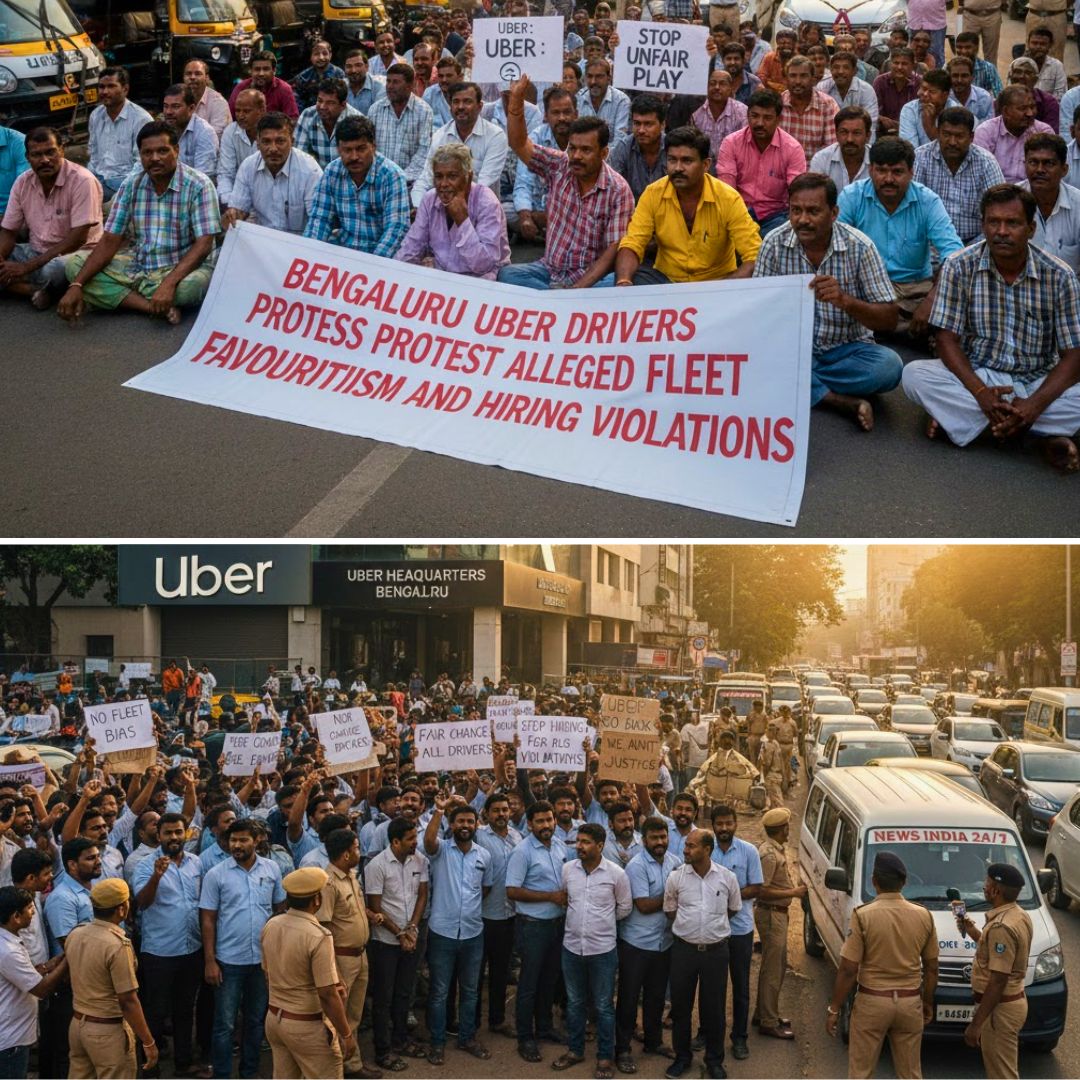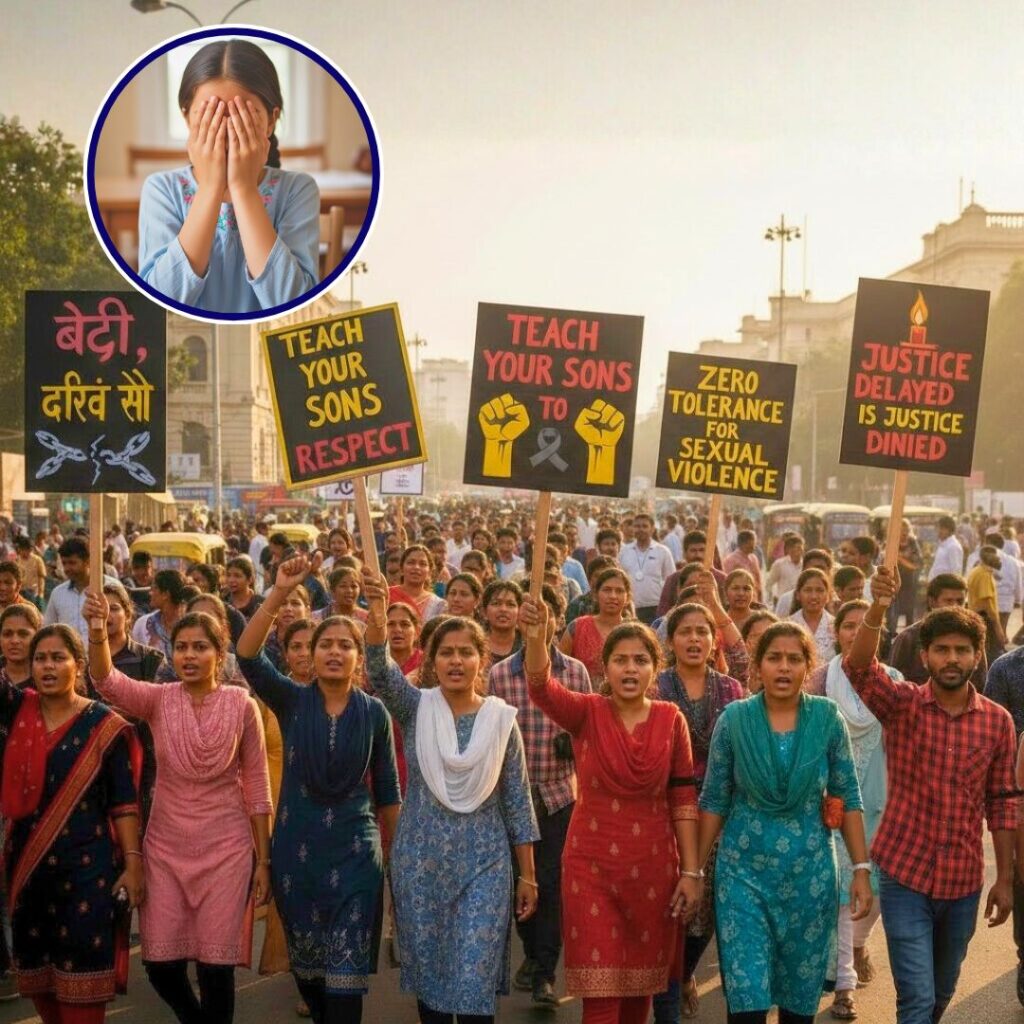Hundreds of Uber drivers protested outside the company’s driver attachment centre in Bommanahalli, Bengaluru, on Monday, accusing the company of favouring fleet-owned vehicles over independent drivers and hiring drivers from outside Karnataka, including allegedly from Bangladesh.
Led by the Bharath Transportation Group, the drivers claimed these practices are destroying their livelihoods by reducing their access to rides and earnings.
The protest turned disorderly when some drivers tried to forcibly enter the Uber office, resulting in police intervention, lathi charges, and the arrest of eight protesters.
Uber denied any discriminatory practices and reiterated its commitment to fair and equal treatment of all drivers across operational models.
Drivers Demand Fair Play and Livelihood Security
The protest, which saw hundreds of drivers gather early morning on November 24, was organised under the banner of the Bharath Transportation Group, representing independent app-based cab drivers in Bengaluru.
Drivers voiced strong concerns that Uber’s current policies disproportionately prioritise fleet-operated vehicles-cars run by third-party companies with drivers hired from outside the state-over individual, independent drivers who own and operate their vehicles.
This has, according to the protesters, drastically reduced the number of daily rides and earnings available to local drivers.
“Uber used to be a platform where independent drivers like me could earn a fair income. Now, most rides go to fleet cars attached to the platform.
Our vehicles sit idle, and we struggle to pay our loans,” said Manjunath, a driver who joined the protest. Drivers also accused Uber of recruiting drivers from outside Karnataka without proper police verification or valid licences, violating state rules that require individuals to have lived in Karnataka for a minimum of two years to be eligible for such jobs.
The group demanded Uber implement the government-mandated ‘One City, One Fare’ fare system, asserting the company often imposes surge pricing that unfairly burdens passengers and driver partners alike.
The protest escalated when Uber staff locked the doors of the centre, and some drivers attempted to forcibly enter, leading to clashes with police.
Authorities deployed lathi charges to disperse the crowd and arrested eight individuals for unlawful assembly, vandalism, and obstructing police personnel. Among those detained were six Uber drivers and two activists from a Hindu organisation.
Tensions Rooted in Broader Gig Economy Challenges
This protest reflects wider tensions in Bengaluru’s gig economy, where app-based drivers have repeatedly raised grievances about falling incentives, ambiguous commission structures, and a lack of social security protections.
Independent drivers accuse the platforms of favouring large fleets with commercial contracts, which enjoy preferential algorithms that assign more rides, thus diminishing opportunities for local operators.
This shift has created financial insecurity for many small-scale drivers who invested heavily in buying vehicles to work as app-affiliated drivers.
The Karnataka Transport Department has previously issued advisories mandating compliance with state labour laws and verification norms for drivers, but enforcement has faced challenges.
Critics argue that platforms exploit loopholes by classifying drivers as independent contractors rather than employees, limiting benefits like insurance, health coverage, and pension plans.
The recent protest is only the latest in a series of labour agitations among gig workers in Bengaluru that have at times turned confrontational. Earlier, similar protests targeted Ola and other ride-hailing companies over incentive cuts and opaque pay policies.
The rise of fleet vehicles-owned and operated by companies that subcontract drivers-has altered the competitive landscape, exacerbating tensions between independent drivers and aggregators.
Company and Official Responses
Uber issued a statement condemning the violent elements of the protest and firmly denied allegations of discriminatory practices. A spokesperson said, “We categorically reject any claims of differing treatment between fleet and independent drivers.
Our policies ensure fairness, transparency, and equal opportunity for all drivers regardless of their operational model. Uber operates a zero-commission model where drivers retain 100% of their fares after paying a nominal subscription fee.”
Police officials highlighted the disruption caused by the protest and the illegal nature of the assembly. Deputy Commissioner of Police M Narayana stated, “The protestors obstructed police work and damaged property.
Some women police officers were manhandled during the incident. To restore order, necessary action was taken, including the detention of the accused.”
Despite the unrest, no severe injuries were reported, and the protest concluded by late afternoon. Authorities called for dialogue between Uber management and driver representatives to address the grievances through peaceful negotiations.
The Logical Indian’s Perspective
The Logical Indian believes that technological platforms like Uber have revolutionized urban transport, but this progress underpins the lives of thousands of drivers who depend on fair opportunities and stable incomes.
Ignoring their grievances risks alienating the very individuals who form the backbone of these services.
Local independent drivers should be treated not merely as contractors but as valued partners whose welfare matters. Companies in the gig economy should cultivate transparent policies that protect workers’ rights and do not compromise livelihoods for efficiency or profit gains.
Moreover, clashes that escalate to police intervention are reminders that conflict resolution through empathy, cooperation, and constructive conversations is essential.
Both companies and regulatory authorities need to work closely with driver unions to implement clear, enforceable guidelines for hiring, ride allocation, and fare structures that uphold social justice without stifling innovation.











